MedievalReporter.com
Covering history's most marvelous millennium
Join our newsletter!

Covering history's most marvelous millennium
Covering history's most marvelous millennium
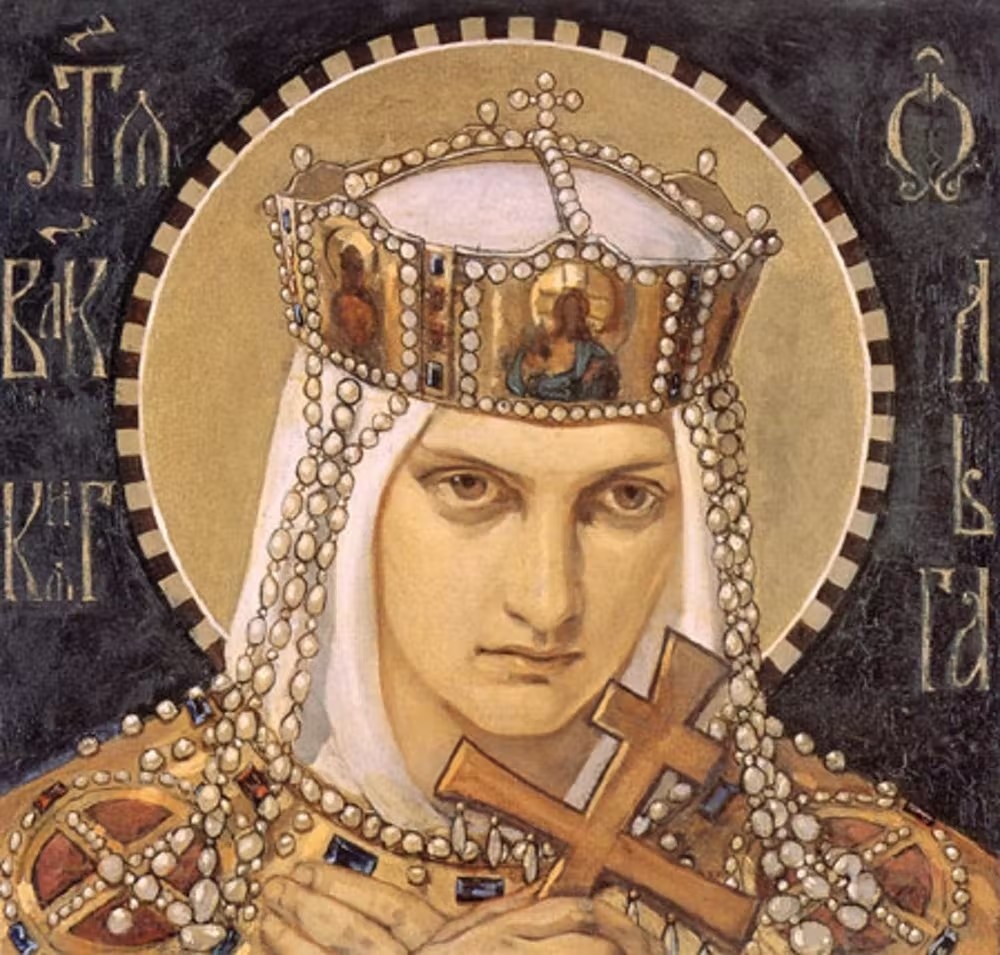
Olga of Kiev ruled the Rus’ – a medieval people in Ukraine related to the Vikings – for over 15 years. She is primarily known for her christianizing influence on the Rus’ lands during her later years in power. But the start of her regency is just as compelling a story.
She became leader of the Rus’ because her husband, the grand prince, was atrociously killed by the Drevlian tribe while their son was still an infant. Obsessed with revenge, Olga’s early reign was consumed by a systemic and ruthless payback campaign against the Drevlians.
Grab a short intro to Kievan Rus’ from our Medieval Guidebook.
The area that would later become Ukraine was under frequent attack during the 9th and 10th centuries CE. With the Viking Age in full swing, Scandinavian raiders known as Varangians came sailing down the Dnieper river. At first, they only came to trade. But it only took a couple of decades for these mercantile expeditions to grow into aggressive invasions. The Vikings turned on the local Slav population.
By 882, the Varangians had seized Kiev (Kyiv). Their leader proclaimed himself Grand Prince of Kiev and started carving out an empire in Eastern Europe. The state he founded and expanded is called the Kievan Rus’ state – to distinguish it from Russia, which is a much younger country, tracing its stately roots back to the 13th century CE at the earliest.
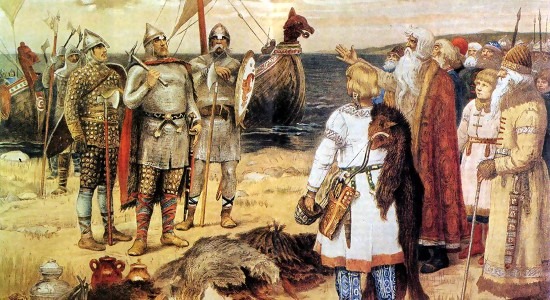
One of the local tribes, the Drevlians, was among the Slavs subjugated by the Rus’. They even fought for their new overlords, going as far as conducting war against the mighty Byzantine Empire for them. But when the Rus’ grand prince died in 912, the Drevlians stopped cooperating and halted their tribute payments to Kiev.
The new Rus’ grand prince was Olga’s husband, Igor. He spent much of his reign fighting the superpowers of his time. Igor launched another Kievan Rus’ attack against the Byzantines, twice reaching their capital Constantinople but failing to besiege it successfully. Later, he plundered territories of the Abbasid Caliphate around the Caspian Sea. Finally, by 945, he deemed the time was right to settle internal matters: he attacked the Drevlians to extract new tribute payments from them.
Confronted by Igor’s much larger army, the Drevlians gave in. They agreed to resume tribute payments to the Rus’. On the way home, however, Igor felt unsatisfied. He thought there was more to extort from this tribe and turned back to increase his demands, this time accompanied by only a small retinue. The Drevlians were enraged by his oppressive commands and – now unimpressed by his small following – overwhelmed and promptly murdered him in a gruesome manner:
“They had bent down two birch trees to the prince’s feet and tied them to his legs; then they let the trees straighten again, thus tearing the prince’s body apart.”
— Byzantine historian and chronicler Leo the Deacon (10th century CE)
– advertisement –
– article continues below –
The son and successor of Igor, Sviatoslav, was only three years old at the time. In need of new leadership, his mother Olga ruled the Kievan Rus’ in his stead, as a regent. She would lead the state for 15 years as Grand Princess.
Her first order of business was to take revenge for the killing of her husband. The Drevlians, on the other hand, emboldened by their seemingly successful uprising, added insult to injury. They sent a delegation to Olga, which proposed that she marry the leader of the Drevlians, prince Mal.
The Drevlians thus hoped to accomplish two things:
Olga, sensing an opportunity, responded to the embassy:
“Your proposal is pleasing to me, indeed, my husband cannot rise again from the dead. But I desire to honor you tomorrow in the presence of my people. Return now to your boat, (…) I shall send for you on the morrow, and you shall say, ‘We will not ride on horses nor go on foot, carry us in our boat.’ And you shall be carried in your boat.”
— Grand Princess Olga’s response to the Drevlian emissaries
On the morrow, Olga met the messengers near the river, as promised. When they repeated the words she had instructed them to speak, the people of Kiev grabbed the Drevlian boats and – with the ambassadors in them – carried them over their heads. As they were paraded across the Rus’ capital, the Drevlians thought Olga was paying them a great honor. That is, until the procession reached her court, where a deep trench had been dug overnight. The Rus’ unceremoniously tipped over the boats, threw their enemies in the ditch, and buried them alive.
While they were being covered with earth and stone, Olga asked them whether “they found the honor to their taste”.
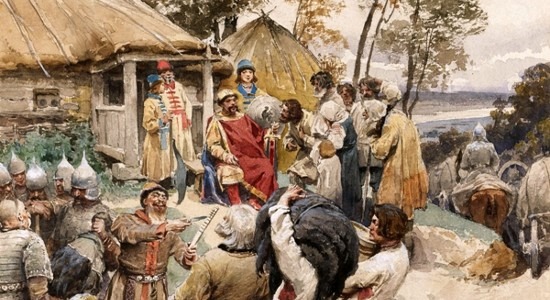
Immediately, the grand princess took the next step of her vengeful plan. She sent a message to prince Mal, who was still in the Drevlian homeland. Olga asked him to send his “[most] distinguished men to her in Kiev, so that she might go to their Prince with due honor” to marry Mal.
Unaware of the fate of the first party, prince Mal was elated by Olga’s positive response. He gathered his best men and sent them to the Rus’ capital. When they arrived, the grand princess ordered her people to draw their visitors a nice, hot bath. She asked the Drevlian men to meet her after they had bathed. Weary from the long journey, the emissaries eagerly entered the bathhouse.
Olga now played her next trick. She had her people set fire to the building, starting with the doorways. The ambassadors were burned alive inside.
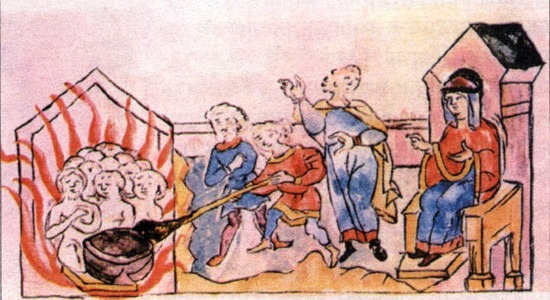
Upping the ante, Olga now sent another message to the Drevlian homeland. She ordered prince Mal to “prepare great quantities of mead in the city where you killed my husband, that I may weep over his grave and hold a funeral feast for him.” Olga then finally traveled to Korosten, the capital of the Drevlians.
Prince Mal probably found it pretty suspicious that both his diplomatic parties had not returned. But unwilling to spurn his future wife, he duly threw a funeral feast for her when she arrived. The Drevlians thirsted after all the mead they had gathered and soon engaged in heavy drinking. Olga and her followers played along but went easy on the booze. When all the attending Drevlians were drunk as a lord, the grand princess ordered her relatively sober retinue to kill their hosts, egging them on to avenge the murder of Igor.
It was a downright massacre.
One could be forgiven for thinking that, by now, the debt of the Drevlians had been paid. But not in the eyes of Olga of Kiev. She returned home and gathered an army posthaste to crush whatever was left of the Drevlian tribe.
The war began extremely favorably for the Kievan Rus’. They won several battles and drove the Drevlians into their cities. However, that’s when problems started to appear for Olga: Korosten in particular withstood her siege for over a year.
Never known to lack creativity, Olga sent the city’s inhabitants another message:
“Why do you persist in holding out? All your cities have surrendered to me and submitted to tribute, so that the inhabitants now cultivate their fields and their lands in peace. But you had rather die of hunger, without submitting to tribute.”
— Olga’s missive to Korosten, the Drevlian capital
The people of Korosten responded that they were willing to pay tribute again, but – not without cause – added that they were afraid that Olga was still intent on taking revenge for her husband’s death. Trying to assuage their fears, Olga answered that the slaughter of the two embassies and the events of the funeral feast were enough for her. She added a seemingly small request: “Give me three pigeons and three sparrows from each house.” The besieged Drevlians, delighted that the grand princess showed her merciful side, did as she asked and sent her the birds.
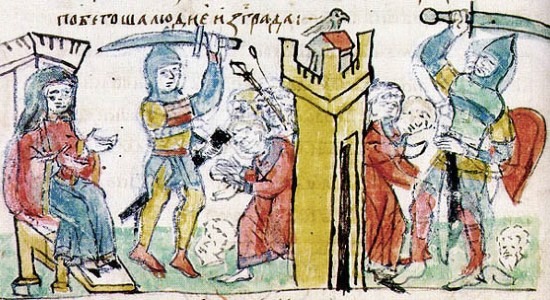
Inside the city, people were already celebrating the end of the war – and for such a small price at that! But in her camp next to the city, Olga ordered her soldiers to attach sulfur and a piece of cloth to the birds’ feet. At night, they set the cloth on fire and released the birds, who duly flew back to their nests in town. A swarm of burning birds came down on Korosten, which mostly contained wooden buildings. Within moments, the city was ablaze.
As one source put it:
“There was not a house that was not consumed, and it was impossible to extinguish the flames, because all the houses caught fire at once.”
— The Primary Chronicle, a 12th-century compilation of Kievan Rus’ history
As the Drevlians fled their burning capital, Olga had thousands of them slaughtered. Others she gave as slaves to her followers. Whoever remained was left to pay tribute to the Rus’ once more.
Although the repression of the Drevlian uprising may paint a picture of Olga as a vindictive widow, her historical reputation is altogether different. She spent her later years strengthening and centralizing the young Rus’ state. Significantly, she transferred power to her son Sviatoslav when he reached maturity, continuing Igor’s dynasty.
But what really established Olga’s positive image for ages to come were her religious endeavors. Whilst visiting Constantinople – the Byzantine capital – in the 950s, she converted to Christianity. And she did much to spread her new religion to the Kievan Rus’.
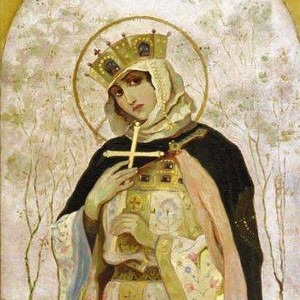
They were at first downright hostile to the idea. Her son Sviatoslav even refused to be baptized. But Olga carried on regardless and had several churches constructed throughout the Rus’ lands.
Most of her subjects nevertheless remained pagan while she lived. But, after she passed away, Olga’s mission turned out to be a great success. Twenty years after her death, her grandson Grand Prince Vladimir the Great famously converted to Christianity.
Because of her proselytizing influence, Olga of Kiev is venerated as a saint in both the Roman Catholic Church as well as the Russian Orthodox Church. The latter even honorifically calls her “Equal to the Apostles”. But the vicious slaughter of most of the Drevlian tribe during her early regency probably makes Olga the most genocidal saint who ever lived.
Disclosure: we work hard to provide you with exclusive medieval reports and guides. To make the Middle Ages accessible to everybody, we’d like this information to remain FREE. Therefore, some of the links below are affiliate links, meaning – at no additional cost to you – we will earn a small compensation if you click through.
Comments are closed.
不知道说啥,开心快乐每一天吧!
Same to you, 三五笑话!
(I have to admit I needed Google Translate to understand your comment.)
I’ve been exploring for a little bit for any high quality articles or blog posts in this kind of house . I finally stumbled upon this site. This was just what I needed.
I’m so glad to hear that, Fulb. Thanks for stopping by!
Long living the peace
Agreed. Let’s hope the modern Ukrainians get to enjoy that soon.
Quality articles, that’s what this web page is providing.
Wow, Ulysses. I’m glad that you enjoy our content so much!
Great read. I most certainly will highly recommend this site!
Thanks so much, Shemeka. Glad you liked it!